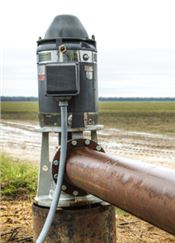|
Due West Farm Saves Energy And Money By Going Electric
Mike Sturdivant III is no stranger to change. After five generations of growing cotton in Glendora, Mississippi, a nematode infestation on the cotton plants in the mid-1990s prompted the family to add corn to the cotton and soybean mix at Due West Plantation.
In addition to tweaking the farm’s crop rotation, Sturdivant and his four siblings recently changed the mix of technologies powering the water pumps used for irrigation. When a water recovery system required installation of new electric motors and upgrading from single-phase to three-phase electricity, the family decided to switch six of its diesel-powered units to electric motors.
The farm’s Entergy representative advised him that he could save money by switching the wells near the powerline from diesel to electric power. “The cost of running electric wells is much cheaper,” Sturdivant says, “even despite lower diesel prices.”
Some of the wells were already on electricity, some were on propane, and others were on diesel. “I was looking at buying additional diesel motors we needed elsewhere on the farm,” Sturdivant says. As it turns out, “it was more cost effective to convert our existing motors to electric than to buy new diesel engines.”
Due West initially bought six 60-horsepower, three-phase electric motors to use with the water recovery project. The farm later converted two more diesel-powered engines to electric motors.
The biggest benefit is the cost savings. “Now that I’ve had a chance to look at the numbers and what it costs to operate the electric motors,” Sturdivant says, “I’ve found that it’s about 1.8 times cheaper to run electric than diesel.”
Another benefit is that by placing the meter pole and switch boxes close to the road, he can cut the power on or off at the highway, without having to go out into the field. Less maintenance is also a plus. With diesel, he says, “you’re continually transporting diesel out to the field and collecting the used oil into another tank for recycling. With electric, it’s just a much cleaner, nicer operation.”
Although Due West paid to have the powerlines placed underground, Entergy covers the cost for overhead power, so long as the project falls within the scope of the utility’s line extension policy.
With close to 100 wells on the plantation, Sturdivant says Due West will be looking to do more electric conversions in the future. “We’re better off because we’re saving energy on a daily basis,” he says. “It didn’t cost me any more to make the switch to electric motors, but my savings are a lot greater.”
To other farmers, Sturdivant offers this advice: “Ask about this program. Find out how much more cost efficient you could be by tapping into this program. It’s been a great opportunity to partner with Entergy in a way that is good for the utility and good for us.”
Install your electric motors now, so you’ll be ready to hit the ground running in the spring. For more information on the Entergy Electric Conversion Program or call 1-844-44WELLS (1-844-449-3557) and mention MidAmerica Farmer Grower.
JP Stewart is a Mississippi-based field representative for the Entergy Electric Conversion Program. ∆

Farmer Mike Sturdivant (left) meets with Mississippi-based Entergy Electric
Conversion Program field rep JP Stewart.
 An Electric motor installed in a field.
An Electric motor installed in a field.
|
|